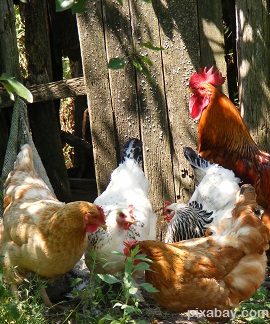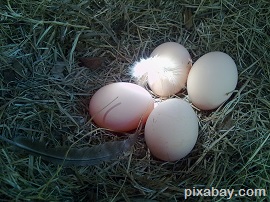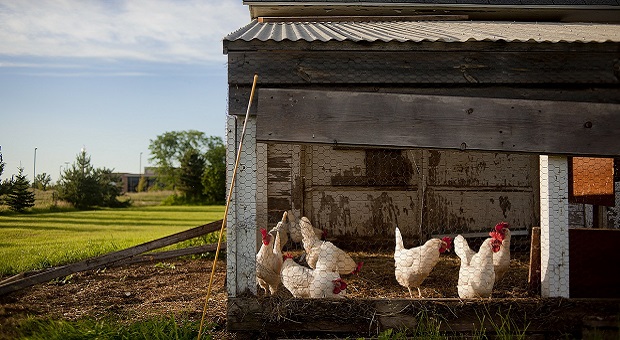Are you having problems with egg production? Do your hens seem to be rebelling against you? Well there may be a good reason for it. They may just need a bit of coddling (chicken style) to make them happy and increase their yield.
It’s a known fact that happy, healthy chickens lay more eggs than ones who aren’t so satisfied and today we’re going to give you a few tips on how to make your hens happy so that they’ll lay more eggs.
1. Don’t forget that they’re birds
It’s easy to just put your chickens in a coop and leave them there but that’s not how they were meant to be. Even though they’ve been domesticated since somebody realized that they tasted great with gravy and that they could lay something that had about a kazillion different delicious uses, chickens still have bird instincts.
They like to roam. They like to flap their wings and pretend they can fly. They like to scratch around looking for things to eat. If it’s at all possible, let them roam. If you don’t have that luxury, at least give them a coop big enough for them to stretch their wings.
2. Give them something to do
Bored chickens are unhappy chickens. Scratching around gives them something to do and it also helps boost their metabolism and keep them warm in the winter. Throw your hens in some leftover vegetable scraps or the weeds that you just pulled from your garden.
The ends of cabbage heads and wilted lettuce will give them something to peck at and they will soon turn it into the dirt and manure in their coop, making it excellent compost. Corn cobs, whole melons or melon rinds make great scratch, too. Any kind of scraps will do, as long as their vegetables.
3. Let them forage

4. Build them a nice coop
Though an airtight coop with no breezes sounds like a warm, cozy, ideal chicken coop, it’s actually not. You’ve likely been inside your coop when it was sweltering hot. If it’s poorly ventilated, it was not only uncomfortably warm in there, it also smelled bad.
A coop with good ventilation will keep your hens comfortable and let air flow through so that disease-causing bacteria won’t have as much chance to flourish. It will also help keep your coop dry so that it doesn’t smell as bad. That helps with the bacteria growth, too.
Make sure that they each have a place to roost at night and provide plenty of nesting boxes – at least 1 for every 4 hens. Finally, if your chickens are in the pen all day, you should ideally have 10 square feet per chicken.
Our coop has hinged doors on the sides with screen so that we can keep them open most of the time but close them up if there’s a particularly cold, windy night. Our hens seem to appreciate it.
5. Give your girls a place to take a dirt bath
Chickens clean themselves and keep their skin and feathers in good condition by taking dirt baths. It also helps keep them free of mites and lice and they smell better. They’ll roll around in it and work it all through their feathers. If your chickens are free-roaming, they will make a dirt bath in your favorite flower bed if you don’t provide them with one.
Pick a spot for your hen spa and either dig a hole or find a container that’s at least 12 inches deep and 24 inches across each direction. Fill it with sand and dirt. Some people use wood ash, which is fine if you have it. Others say to use diatomaceous earth, but I don’t because it comes with a warning to wear a mask when using it. If I can’t breathe it, I figure my chickens shouldn’t either. If it comes right down to it, just sand will work.
A side benefit of a dirt bath is that it’s hilarious to watch. Your hen will flop around in it, roll in it, and do all kinds of funny stuff.
6. Keep their lives stress-free
Stress is at the very top of the list when it comes to reduced egg production. Chickens don’t like to be chased by kids or dogs. They don’t care much for loud music or vehicles coming and going past them all the time. Predators in the coop terrify them and will keep them from producing. Just about anything that you consider stressful will be stressful for your girls, too. Keep their area quiet and safe.
If you bring home new hens, it will be a bit of a transition for them. They’ll lay 2 or three eggs that were already in the making but then they may slack off for a few days or a week. It’s normal. Just let them adjust and keep their environment calm and collected and they’ll pick right back up where they left off.
7. Provide physical requirements for good laying

On the other hand, your ladies need a break sometimes. Laying eggs is hard work so if you’d like to give them a bit of rest and relaxation, skip the extra light. They’ll still lay, but production will go down by 1/3 or even 1/2. It’s up to you to determine how many eggs you need.
8. Don’t think that you NEED a rooster
Unless you’re hatching out more chickens, a rooster isn’t going to add anything but commotion to your flock. If your egg production is down, buying a rooster isn’t going to help matters any. If you do use a rooster so that you can hatch out chicks, be prepared to find homes (or gravy-related options) for roosters because you’ll have plenty of new ones in every batch.
Keeping your hens healthy, happy and safe is the best way to get the most from your girls. If you want to increase egg production, increase the happiness of your hens!
I’m sure that I didn’t touch on everything in this article so if you have tips that you’d like to add, please share them with us in the comments section below. Until next time, may the cluck be with you.
This article has been written by Theresa Crouse for Survivopedia.










Ron Sanders | August 20, 2015
|
Thank you for an excellent-written article on hens and egg-laying. It was refreshing information that encourages one to live off-the-grid at least in one way.
pete | August 20, 2015
|
Great!
tomas | August 20, 2015
|
Well I know from experience, chickens will at just about anything.It is a good thing they aren’t 7 feet tall , they might eat you. I had a gallon of dill pickles, about 6 years old, I tried hem they were terrible, the chickens however , just loved them, like sauerkraut to. All the fruits and veggies from the garden that got bird pecked or looked otherwise unappealing for human consumption, they just love it. I get them things wen I make groceries that I can’t have ( I’m diabetic) cheap cereals, day old donuts, chips, and any of those ” about to go bad ” fruits and veggies. They know I am getting them something, and gather around the truck when I pull in, I have to ive them something just so I can unload in peace or they will try to follow into the house. Sometimes they want to roost in trees at night, to get the stragglers in I just throw a few slices of white bread into the coop, they are crazy for white bread. Other favorites hot dogs, scrambled eggs mixed with feed, put th shells in it to ( if you get to many to eat yourself) and ( this is a little sick but….) fried chicken, to dried out or bones with some still on it, they will chase each other down to get it. If you can let your chickens free range, they will get rid of most insects, just be sure you fence off your crops, they’re constant scratching keeps the weeds down to . Also have some evergreen trees or bushes about if you can, dirt baths under evergreens get rid of more parasites tan just plain dirt, and the girls have a piney fresh aroma to.
Oliver | August 21, 2015
|
I would not recommend feeding chickens chicken, or eggs for that matter. They can get taste for it and start pecking at one another, or their own eggs. Once cannibalism sets in with a hen, the only thing to do is cull the bird, or else the rest of the flock will start in.
The poster may have had good luck with this, but I will tell you this way lies madness.
jason | September 13, 2015
|
My mom grew up around chickens and has told me pretty much everything you said. However, I don’t think it’s a good idea to feed them chicken or eggs. As Oliver pointed out, that will likely lead to trouble.
Julie | August 20, 2015
|
I’ve read that birds of a feather really do flock together, meaning get 4 of the same breed of chicken. It will make them happier and lay more eggs.
Paul | August 21, 2015
|
Chickens love yogurt and cottage cheese and whole milk. These forms of dairy are a good source of protein and fat (don’t use the fat free or 2% stuff, for your animals or for yourself) and also calcium. It’s especially good in the colder months, when bugs and grubs and stuff aren’t as plentiful in some cooler areas. Plus, the pro-biotic properties of yogurt (especially homemade) are good for chickens for the same reason they’re good for people. As a matter of fact, yogurt with live cultures is a good thing to occasionally feed to any omnivorous or carnivorous creature you might be keeping, including cats and dogs. Just make sure to not feed them any dairy that isn’t fit for human consumption. Unlike vegetables that are past their prime (and some dogs and cats can handle rancid meat, if they’re used to it), sour or rotting dairy is just as bad for your animals as it is for you.
Rob Siedenburg | August 22, 2015
|
It’s best if you feed egg shells to your hens to smash them thoroughly and dry them well, so the hens don’t associate them with eggs. I’ve seen hens start pecking, breaking, and eating eggs, after being fed just plain egg shells.
Connie Vore | September 13, 2015
|
I Have been working with chickens since I was 6 yrs old. well except when I was on active duty. I found that when I started a new flock with young chicks they didn’t know how to roost. So I would always find 2 older hens and they would teach the chicks how to scratch, bathe and roost much faster than me trying to teach them! I also use a heat light for 5 hrs a day during the winter which keeps my hens happy and laying great! I also add 2-4 new chicks every other yr plus new meat chicks very year. I do not have roosters as I sell my eggs and do not like the blood in the eggs that can come with roosters rights!
Here’s to being more self supporting!
Pingback:How To DIY A Chicken Feeder | Survivopedia | February 28, 2016
|
Pingback:12 Must Know Before Expanding Your Livestock | NewZSentinel | February 28, 2016
|
Pingback:14 Cheap Ways To Feed Your Chickens | | disasterdefense.us | May 19, 2016
|
Osman | November 1, 2016
|
I just started my poultry farming some one month ago with 300 layers, they have all been confined in a nice structure, I on the lights for them from 5pm till 7am, please is it advisable? and besides, how many times should I give them feed? all day long? or morning and evening? and I have 2 security dogs around the coop, so I plan never ever to open them not even for a minute because of the dogs, will that affect their egg laying? Thank you
Pingback:3 Ways To Add A Rooster To Your Flock | Survivopedia | December 13, 2016
|
Pingback:How To Make Hens Lay More In The Summer | Survivopedia | July 10, 2017
|
Pingback:Choosing Chickens for Eggs and Meat | Survivopedia | July 31, 2017
|
Charle Anastasia | October 4, 2017
|
Thank you. I have 6 hens and they’re laying between 6-9 eggs a day between them. I cuddle them when I feed them. They seem to like the attention. I throw meal worms all around their coop. They enjoy foraging. I also put in ceramic eggs into their nesting boxes. once I did that… the egg laying really picked up. We love them.